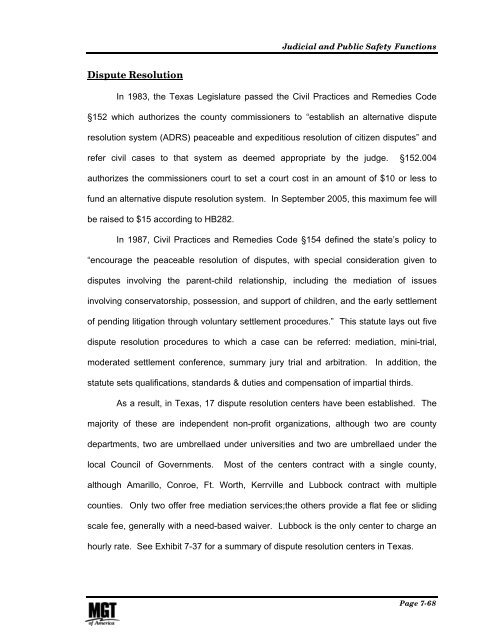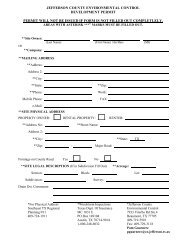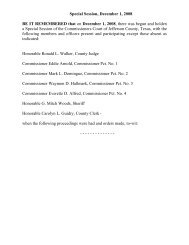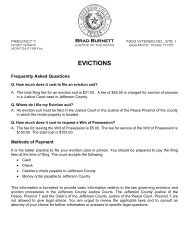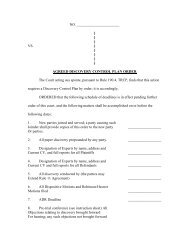- Page 1 and 2:
Management and Performance Review o
- Page 3 and 4:
TABLE OF CONTENTS (Cont’d) 7.0 JU
- Page 5 and 6:
ACKNOWLEDGEMENTS This review has be
- Page 7 and 8:
EXECUTIVE SUMMARY MGT was selected
- Page 9 and 10:
Executive Summary To finance these
- Page 11 and 12:
Executive Summary from generating e
- Page 13 and 14:
Executive Summary assistant chiefs,
- Page 15 and 16:
Executive Summary in good working o
- Page 17 and 18:
CHAPTER 1.0 INTRODUCTION AND BACKGR
- Page 19 and 20:
Introduction and Background 1. Ford
- Page 21 and 22:
Introduction and Background EXHIBIT
- Page 23 and 24:
Introduction and Background The rev
- Page 25 and 26:
Jefferson Peer Average Brazoria EXH
- Page 27 and 28:
Introduction and Background Jeffers
- Page 29 and 30:
Introduction and Background Jeffers
- Page 31 and 32:
Introduction and Background EXHIBIT
- Page 33 and 34:
Introduction and Background In Augu
- Page 35 and 36:
2.0 JEFFERSON COUNTY EMPLOYEE SURVE
- Page 37 and 38:
Jefferson County Employee Survey Re
- Page 39 and 40:
Jefferson County Employee Survey Re
- Page 41 and 42:
Jefferson County Employee Survey Re
- Page 43 and 44:
Jefferson County Employee Survey Re
- Page 45 and 46:
Jefferson County Employee Survey Re
- Page 47 and 48:
Jefferson County Employee Survey Re
- Page 49 and 50:
3.0 ASSESSMENT OF THE ORGANIZATION
- Page 51 and 52:
Assessment of the Organization and
- Page 53 and 54:
Assessment of the Organization and
- Page 55 and 56:
Assessment of the Organization and
- Page 57 and 58:
Assessment of the Organization and
- Page 59 and 60:
Assessment of the Organization and
- Page 61 and 62:
Assessment of the Organization and
- Page 63 and 64:
4.0 ASSESSMENT OF THE FINANCE AND B
- Page 65 and 66:
Assessment of the Finance and Busin
- Page 67 and 68:
Assessment of the Finance and Busin
- Page 69 and 70:
Assessment of the Finance and Busin
- Page 71 and 72:
Assessment of the Finance and Busin
- Page 73 and 74:
Assessment of the Finance and Busin
- Page 75 and 76:
Assessment of the Finance and Busin
- Page 77 and 78:
Assessment of the Finance and Busin
- Page 79 and 80:
Assessment of the Finance and Busin
- Page 81 and 82:
Assessment of the Finance and Busin
- Page 83 and 84:
Assessment of the Finance and Busin
- Page 85 and 86:
Assessment of the Finance and Busin
- Page 87 and 88:
Assessment of the Finance and Busin
- Page 89 and 90:
Assessment of the Finance and Busin
- Page 91 and 92:
Assessment of the Finance and Busin
- Page 93 and 94:
Assessment of the Finance and Busin
- Page 95 and 96:
Assessment of the Finance and Busin
- Page 97 and 98:
Assessment of the Finance and Busin
- Page 99 and 100:
Assessment of the Finance and Busin
- Page 101 and 102:
Assessment of the Finance and Busin
- Page 103 and 104:
Assessment of the Finance and Busin
- Page 105 and 106:
Assessment of the Finance and Busin
- Page 107 and 108:
Assessment of the Finance and Busin
- Page 109 and 110:
Assessment of the Finance and Busin
- Page 111 and 112:
Assessment of the Finance and Busin
- Page 113 and 114:
CHAPTER 5.0 HEALTH & WELFARE/LIBRAR
- Page 115 and 116:
Health & Welfare/Library/Veterans S
- Page 117 and 118:
Health & Welfare/Library/Veterans S
- Page 119 and 120:
Health & Welfare/Library/Veterans S
- Page 121 and 122:
Health & Welfare/Library/Veterans S
- Page 123 and 124:
Health & Welfare/Library/Veterans S
- Page 125 and 126:
Health & Welfare/Library/Veterans S
- Page 127 and 128:
Health & Welfare/Library/Veterans S
- Page 129 and 130:
Health & Welfare/Library/Veterans S
- Page 131 and 132:
Health & Welfare/Library/Veterans S
- Page 133 and 134:
Health & Welfare/Library/Veterans S
- Page 135 and 136:
Health & Welfare/Library/Veterans S
- Page 137 and 138:
Health & Welfare/Library/Veterans S
- Page 139 and 140:
Health & Welfare/Library/Veterans S
- Page 141 and 142:
Health & Welfare/Library/Veterans S
- Page 143 and 144:
Health & Welfare/Library/Veterans S
- Page 145 and 146:
Health & Welfare/Library/Veterans S
- Page 147 and 148:
Health & Welfare/Library/Veterans S
- Page 149 and 150:
Health & Welfare/Library/Veterans S
- Page 151 and 152:
6.0 MAINTENANCE - EQUIPMENT AND STR
- Page 153 and 154:
Maintenance - Equipment and Structu
- Page 155 and 156:
Maintenance - Equipment and Structu
- Page 157 and 158:
Maintenance - Equipment and Structu
- Page 159 and 160:
Maintenance - Equipment and Structu
- Page 161 and 162:
Maintenance - Equipment and Structu
- Page 163 and 164:
Maintenance - Equipment and Structu
- Page 165 and 166:
Maintenance - Equipment and Structu
- Page 167 and 168:
Maintenance - Equipment and Structu
- Page 169 and 170:
Maintenance, and Fleet Operations o
- Page 171 and 172:
Maintenance, and Fleet Operations o
- Page 173 and 174:
Maintenance, and Fleet Operations o
- Page 175 and 176:
Maintenance, and Fleet Operations o
- Page 177 and 178:
Maintenance, and Fleet Operations o
- Page 179 and 180:
CHAPTER 7.0 JUDICIAL AND PUBLIC SAF
- Page 181 and 182:
Judicial and Public Safety Function
- Page 183 and 184:
Judicial and Public Safety Function
- Page 185 and 186:
Judicial and Public Safety Function
- Page 187 and 188:
Judicial and Public Safety Function
- Page 189 and 190:
Judicial and Public Safety Function
- Page 191 and 192:
Judicial and Public Safety Function
- Page 193 and 194:
Judicial and Public Safety Function
- Page 195 and 196: Judicial and Public Safety Function
- Page 197 and 198: Judicial and Public Safety Function
- Page 199 and 200: Judicial and Public Safety Function
- Page 201 and 202: Judicial and Public Safety Function
- Page 203 and 204: Judicial and Public Safety Function
- Page 205 and 206: Judicial and Public Safety Function
- Page 207 and 208: Judicial and Public Safety Function
- Page 209 and 210: Judicial and Public Safety Function
- Page 211 and 212: Judicial and Public Safety Function
- Page 213 and 214: Judicial and Public Safety Function
- Page 215 and 216: Judicial and Public Safety Function
- Page 217 and 218: Judicial and Public Safety Function
- Page 219 and 220: Judicial and Public Safety Function
- Page 221 and 222: Judicial and Public Safety Function
- Page 223 and 224: Judicial and Public Safety Function
- Page 225 and 226: Judicial and Public Safety Function
- Page 227 and 228: Judicial and Public Safety Function
- Page 229 and 230: Judicial and Public Safety Function
- Page 231 and 232: Judicial and Public Safety Function
- Page 233 and 234: Judicial and Public Safety Function
- Page 235 and 236: Judicial and Public Safety Function
- Page 237 and 238: Judicial and Public Safety Function
- Page 239 and 240: Judicial and Public Safety Function
- Page 241 and 242: Judicial and Public Safety Function
- Page 243 and 244: Judicial and Public Safety Function
- Page 245: Judicial and Public Safety Function
- Page 249 and 250: Judicial and Public Safety Function
- Page 251 and 252: 8.0 ENTERPRISE OPERATIONS OF JEFFER
- Page 253 and 254: Enterprise Operations of Jefferson
- Page 255 and 256: Enterprise Operations of Jefferson
- Page 257 and 258: Enterprise Operations of Jefferson
- Page 259 and 260: Enterprise Operations of Jefferson
- Page 261 and 262: Enterprise Operations of Jefferson
- Page 263 and 264: Enterprise Operations of Jefferson
- Page 265 and 266: Enterprise Operations of Jefferson
- Page 267 and 268: Enterprise Operations of Jefferson
- Page 269 and 270: Enterprise Operations of Jefferson
- Page 271 and 272: Enterprise Operations of Jefferson
- Page 273 and 274: Enterprise Operations of Jefferson
- Page 275 and 276: Enterprise Operations of Jefferson
- Page 277 and 278: Enterprise Operations of Jefferson
- Page 279 and 280: Enterprise Operations of Jefferson
- Page 281 and 282: Enterprise Operations of Jefferson
- Page 283 and 284: Enterprise Operations of Jefferson
- Page 285 and 286: Enterprise Operations of Jefferson
- Page 287 and 288: Enterprise Operations of Jefferson
- Page 289 and 290: Enterprise Operations of Jefferson
- Page 291 and 292: Enterprise Operations of Jefferson
- Page 293 and 294: Enterprise Operations of Jefferson
- Page 295 and 296: Enterprise Operations of Jefferson
- Page 297 and 298:
Enterprise Operations of Jefferson
- Page 299 and 300:
APPENDIX 1 ECONOMIC DEVELOPMENT INC
- Page 301 and 302:
Economic Development Incentives Pol
- Page 303 and 304:
Economic Development Incentives Pol
- Page 305 and 306:
Economic Development Incentives Pol
- Page 307 and 308:
Economic Development Incentives Pol
- Page 309 and 310:
Economic Development Incentives Pol
- Page 311 and 312:
Economic Development Incentives Pol
- Page 313 and 314:
Economic Development Incentives Pol
- Page 315 and 316:
Economic Development Incentives Pol
- Page 317 and 318:
Economic Development Incentives Pol
- Page 319 and 320:
APPENDIX 2 FISCAL IMPACT SUMMARY
- Page 321 and 322:
Fiscal Impact Summary Recommendatio
- Page 323:
Fiscal Impact Summary Recommendatio


